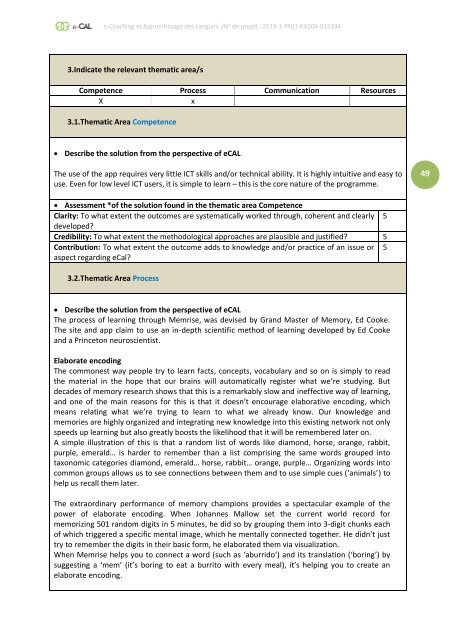e-CAL - e-Coaching et Apprentissage des Langues
The ERASMUS+ project e-CAL presents the result of an analysis of support methods in the case of language learning using web-based Open Educational Resources (OER).
The ERASMUS+ project e-CAL presents the result of an analysis of support methods in the case of language learning using web-based Open Educational Resources (OER).
Create successful ePaper yourself
Turn your PDF publications into a flip-book with our unique Google optimized e-Paper software.
e-<strong>Coaching</strong> <strong>et</strong> <strong>Apprentissage</strong> <strong>des</strong> <strong>Langues</strong> /N° de proj<strong>et</strong> : 2015-1-FR01-KA204-015334<br />
3.Indicate the relevant thematic area/s<br />
Comp<strong>et</strong>ence Process Communication Resources<br />
X<br />
x<br />
3.1.Thematic Area Comp<strong>et</strong>ence<br />
Describe the solution from the perspective of e<strong>CAL</strong><br />
The use of the app requires very little ICT skills and/or technical ability. It is highly intuitive and easy to<br />
use. Even for low level ICT users, it is simple to learn – this is the core nature of the programme.<br />
49<br />
Assessment *of the solution found in the thematic area Comp<strong>et</strong>ence<br />
Clarity: To what extent the outcomes are systematically worked through, coherent and clearly 5<br />
developed?<br />
Credibility: To what extent the m<strong>et</strong>hodological approaches are plausible and justified? 5<br />
Contribution: To what extent the outcome adds to knowledge and/or practice of an issue or 5<br />
aspect regarding eCal?<br />
3.2.Thematic Area Process<br />
Describe the solution from the perspective of e<strong>CAL</strong><br />
The process of learning through Memrise, was devised by Grand Master of Memory, Ed Cooke.<br />
The site and app claim to use an in-depth scientific m<strong>et</strong>hod of learning developed by Ed Cooke<br />
and a Princ<strong>et</strong>on neuroscientist.<br />
Elaborate encoding<br />
The commonest way people try to learn facts, concepts, vocabulary and so on is simply to read<br />
the material in the hope that our brains will automatically register what we’re studying. But<br />
deca<strong>des</strong> of memory research shows that this is a remarkably slow and ineffective way of learning,<br />
and one of the main reasons for this is that it doesn’t encourage elaborative encoding, which<br />
means relating what we’re trying to learn to what we already know. Our knowledge and<br />
memories are highly organized and integrating new knowledge into this existing n<strong>et</strong>work not only<br />
speeds up learning but also greatly boosts the likelihood that it will be remembered later on.<br />
A simple illustration of this is that a random list of words like diamond, horse, orange, rabbit,<br />
purple, emerald… is harder to remember than a list comprising the same words grouped into<br />
taxonomic categories diamond, emerald… horse, rabbit… orange, purple… Organizing words into<br />
common groups allows us to see connections b<strong>et</strong>ween them and to use simple cues (‘animals’) to<br />
help us recall them later.<br />
The extraordinary performance of memory champions provi<strong>des</strong> a spectacular example of the<br />
power of elaborate encoding. When Johannes Mallow s<strong>et</strong> the current world record for<br />
memorizing 501 random digits in 5 minutes, he did so by grouping them into 3-digit chunks each<br />
of which triggered a specific mental image, which he mentally connected tog<strong>et</strong>her. He didn’t just<br />
try to remember the digits in their basic form, he elaborated them via visualization.<br />
When Memrise helps you to connect a word (such as ‘aburrido’) and its translation (‘boring’) by<br />
suggesting a ‘mem’ (it’s boring to eat a burrito with every meal), it’s helping you to create an<br />
elaborate encoding.


